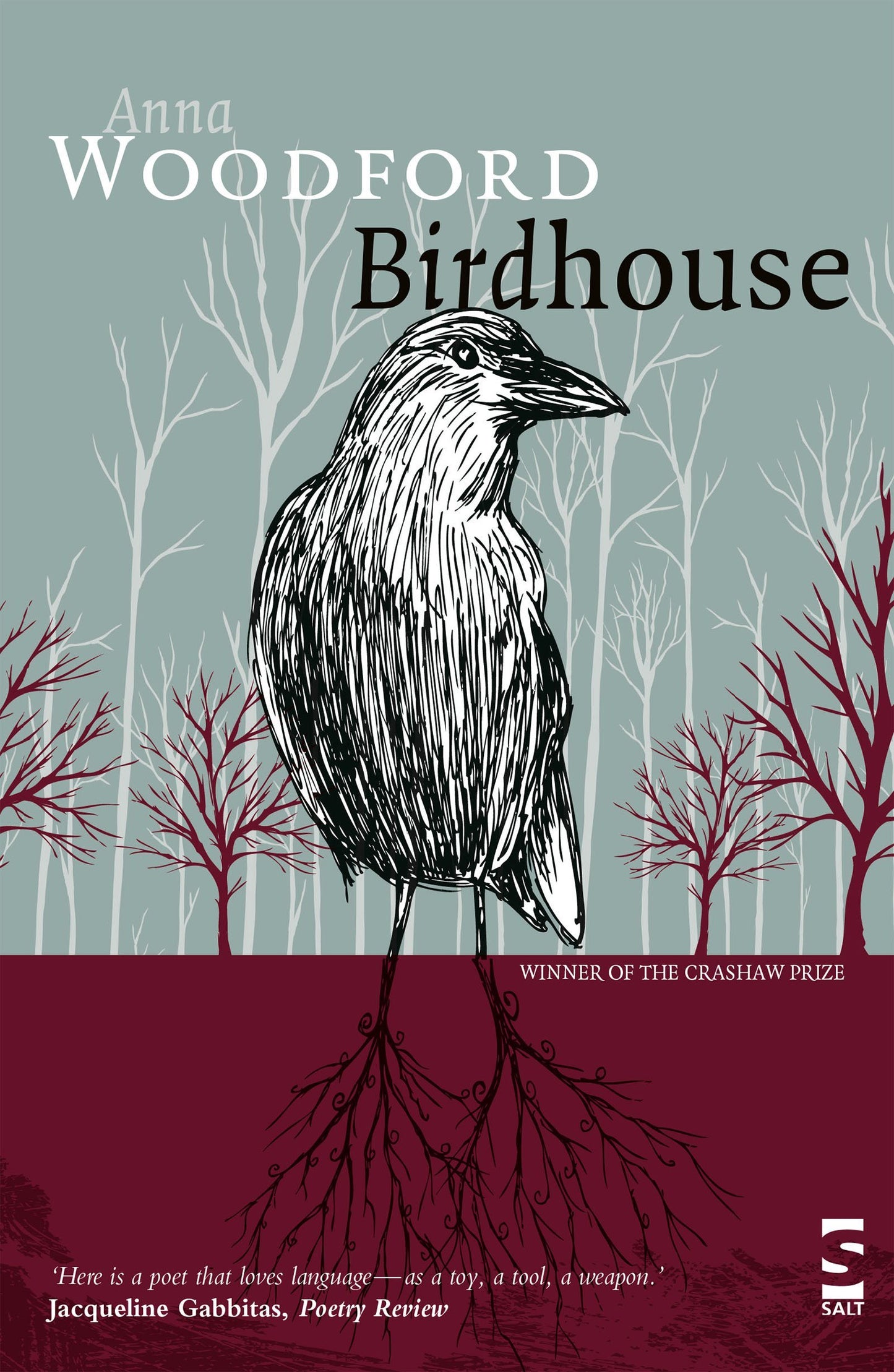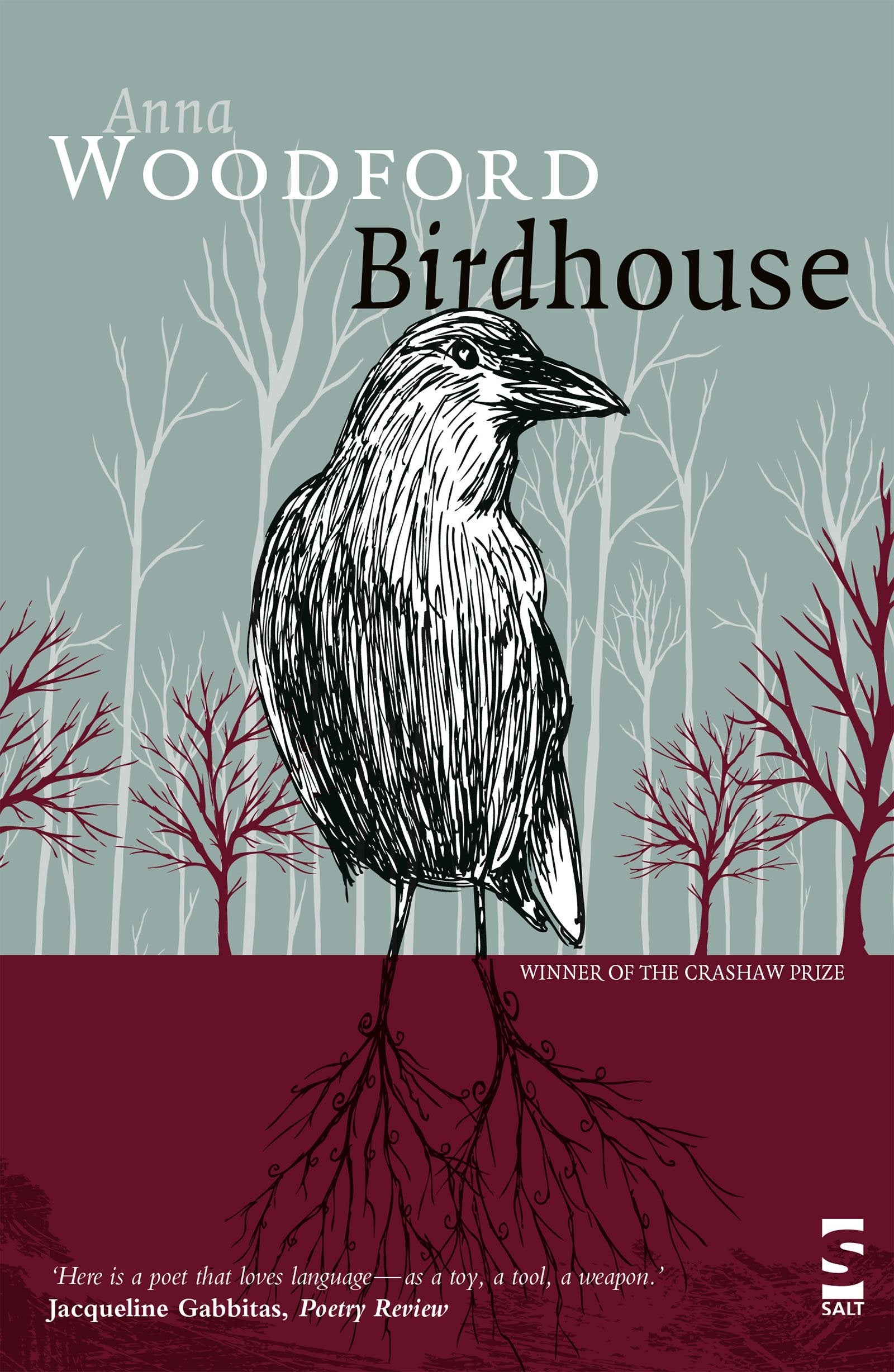Anna Woodford
Birdhouse
Birdhouse
ISBN:9781844717880
Couldn't load pickup availability
Synopsis
From diamonds hidden in a grandmother’s pantry to a peahen’s shout of ecstasy, from the voice of a deranged bridesmaid to that of a nun teaching a sex education lesson, Birdhouse is full of life – and its flip-side. It includes an award-winning sequence of elegies for the poet’s grandparents and great-grandparents who were victims of the holocaust (the sequence was a Poetry Book Society Choice).
Throughout this dazzling debut, Woodford explores sex, running away from school, and the happy ever after endings of Goldilocks and Eliza Doolittle. She takes a reader from Poland to Darlington on a dizzying scenic route involving graveyards and playgrounds. Along the way she celebrates a dead pigeon, a washing line, a big bed scene and an endless pair of legs. Her poems speak directly to a reader. Intimate and compelling. Casually artful. They stir up time and place to dissolving point, honouring the material word but not taking it for what it is. Or isn’t.
Woodford has received an Eric Gregory Award, an Arvon/Jerwood apprenticeship, a Hawthornden Fellowship, a major Leverhulme grant and is a previous winner of the International Poetry Business Competition. Widely published in magazines and anthologies, she has completed residencies in Alnwick Garden, Durham Cathedral and the Tyne & Wear Fire and Rescue Service. Her work has been described by Anthony Rudolf as ‘tough-minded and tender-hearted’.
Praise for Previous Work
‘Anna Woodford’s poems are a delight of intimacy, pleasure, loss and regret, though rather less of regret. They are essentially celebrations, clear and growing brighter with each line, whether the subject is sex, or friendship or family ties, each local, located with just a touch of the astringent (‘Every time I look back/we’re getting better with age’ says one poem.) The poems are delicately made but they are tough too, quite capable of looking after themselves. They are a form of making solid.’ —George Szirtes
‘How much dark one candle/can leave’ writes Anna Woodford at the passing of her grandmother. It’s a dark that will accompany, will see her through. There’s a level-headed love here that, like life itself, is strong enough to carry the equipages of wit and brilliance in her poetry.’ —Gillian Allnutt
‘I never thought I would use the word ‘cool’ as a compliment to characterise a young poet’s work, least of all when it deals with family material of such deep personal resonance. And yet that is my reaction to Anna Woodford’s workings in what has lately become a popular literary territory involving grandparents and immigration. The emotions are strong, and for this very reason, in relation to her material, she stands, whether consciously or intuitively, ‘at a slight angle to the universe’, as Forster famously wrote of Cavafy. She is tough-minded and tender-hearted.’ —Anthony Rudolf
‘Anna Woodford is not afraid to move around the page. Most poets cling to the left-hand margin as a starting point for each poem but Woodford know the value of space. It’s possible to make an impact with just a few words if you know what you are doing and these poems do just that.’ —Ambit
‘The title poem follows Eliza Doolittle and Henry Higgins into their wedding chamber where ‘She’s loud as a headboard/slips into her comfortable mother tongue/he whispers haitches into her ear./In Spain, it continues to rain.’ The recalcitrant Cockney sets the tone for a number of poems where expectations are raised and then refused. ‘Little Girl Dreams’ of being an angel are bleached out by ‘men, coaxing/my eyelids closed like lace curtains. I’d shake under my duvet/like a clenched fist in darkness.’ These similes are startling and satisfyingly exact. The work should entice.’ —Lavinia Greenlaw , Mslexia
‘There are some wonderful poems in Trailer: before long everyone will be mentioning Anna Woodford’s name.’ —Eleanor Livingstone , Sphinx
‘Here is a poet that loves language – as a toy, a tool, a weapon.’ —Jacqueline Gabbitas (review of Party Piece), Poetry Review
‘Anna Woodford’s Party Piece brims with detail and feeling. The knowledges shared with the reader are rich, intimate and sensual, and yet these poems are always on the brink of their own dissolution, the subject ‘unbuttoning / my body and running after you / into the open air’. Woodford’s poems are frequently celebratory, finding absolute joy in the communication with a baby, for instance: ‘suddenly we are speaking / to each other and / holding each other / in and outside of conversation / … / I want the car to go on for ever.’ But Woodford also draws attention to and celebrates the small and often unnoticed details that can fill us with amazement; in ‘Condensation’, she stands before a window one morning in ‘wonder / at the art that will come from our breathing’.
Delightful and affirmative, a hint of danger nevertheless lurks around the corner of several of these poems. In ‘Six Weeks’, for instance, ‘we gathered pans and bowls and cups and egg-cups / trying to contain the flood before the ceiling fell in’. And in the stunning ‘Epithalamium’, or poem for a bride, something yet more unspeakable threatens. At a church, among ‘mucky doves’, the poet tears her lover’s letters into confetti, and as the ‘bells spill over with your joy, with your joy’, she wraps her arms around herself and dances, watching the sky ‘fall in’ on the bride ‘like a train’. Establishing Woodford’s talent, this ability to simultaneously express the affirmative and the threatening is performed once again in ‘Desk’. Here, she recalls starting to write:
I entered
through the desk like a wardrobe,
Mum sneaked in after me, cleaning up
poems like snow from my floor.
And while these poems fall softly, their imprint refuses to melt away. This is a stunning pamphlet from a poet who deserves to be read widely.’ —Sarah Jackson , Assent Magazine
‘Anna Woodford is a rarity: a youngish poet with considerable talent, something to say, and a voice unique as a fingerprint ... Woodford’s poems can give their readers new eyes.’ —Rory Waterman , Sphinx
‘This is an accomplished collection from a writer who deserves a wide readership.’ —Liz Bassett
‘An Anna Woodford poem often looks as if it is about to recount an everyday event, but this is usually twisted out of shape in the course of the poem...subtly devastating [is] a phrase that might sum up the best of her poetry.’ —Rob A Mackenzie


